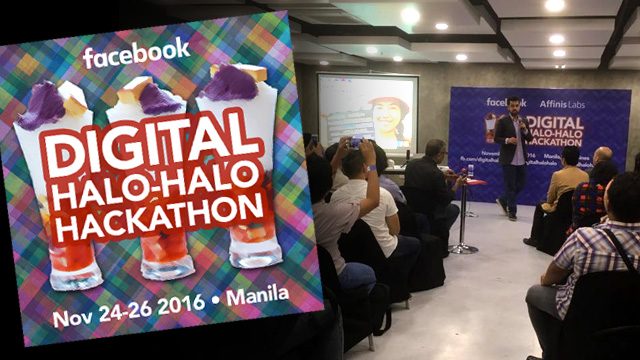SUMMARY
This is AI generated summarization, which may have errors. For context, always refer to the full article.

MANILA, Philippines – Filipinos from different backgrounds will make their pitch at the Digital Halo-Halo Hackathon to be held at the Acceler8 Co-Working Space in Makati on Saturday night, November 26.
For those who want to see the event live, they may register to get a seat. For those who can’t make it, they can watch the livestream which starts at 6 pm. Online viewers can actually participate in the event as they’ll be able to vote for their favorite ideas from the hackathon.
What ideas are these? Rollan, a virtual assistant with a background in human resources, wants to assign a “reliability rating” to Facebook articles to fight misinformation. Think of it as an “IMDB or Rotten Tomatoes” for articles, he said of the proposed browser extension. (Read: Wary of fake news? These Chrome extensions might help)
Lea, a “visual ethnographer” or a person who documents subjects in their natural setting, wants to create campaigns for government initiatives that will make them visually engaging. She wants to promote visual literacy in the country to simplify communication between the government and the people.
Rollan and Lea are just two of the 25 participants of this hackathon whom people may vote for. They are part of the 25 selected from a pool of 100 applicants, who were then divided into 5 groups. One team with the golden idea – the winning pitch – will receive mentorship and $5,000 to help its members execute their ideas.
Selection of participants
The participants were selected through personal interviews conducted by organizing bodies Facebook and Affinis Labs, a company which regularly holds hackathons and helps grow startups. Shahed Amanullah, the co-founder and the Chief Technology Officer of Affinis Labs, shares the key trait they looked for when they narrowed down the selection: passion.
“They must exhibit passion in the way they present their ideas and themselves,” he said. “They must be team players, and they must show an ability to work with others.” Participants with a big ego are discouraged as the organizers want to promote a culture of collaboration rather than domination.
The hackathon organizers also ensured there was diversity among the participants. Amanullah said that anyone could join as long as they were a creative problem solver. “They don’t need to be able to code. They don’t need to be graphic designers – in fact we’ve assigned a dedicated graphic designer to help them communicate their ideas visually. We didn’t just look for the elite people. We looked for people with diverse experiences, storytellers, bloggers, social entrepreneurs and of course, some successful entrepreneurs too.”
To illustrate his point, Amanullah cited the winner of their Indonesia hackathon in June – a 47-year-old comedian who proposed a humorous YouTube video series about combatting myths on social media. With comedy, the winner offered a different way of tackling the issue. Instead of “attacking” netizens, which might only elevate the intensity of the trolling, comedy makes the topic more accessible.
Social change
Whatever the idea may be, Facebook’s Clair Deevy, the Head of Economic Growth Initiatives-Asia Pacific, said that the focus is on social change, enhancing digital literacy, and creating a culture of respectful online engagement. Pretty much everyone is aware of the vitriol being spewed on social media nowadays; it’s in Facebook’s best interests to do what it can to get people to behave better. The Digital Halo-Halo Hackathon is one such way for Facebook to find a solution – a crowdsourced endeavor that will hopefully produce solutions that are organically Filipino.
“We want Facebook to be a happy place to be in,” said Deevy.
To fulfill this, some of the hackathon participants are said to be attempting to break down barriers, make the platform more open to diversity, and address bullying as well as the use of social media to spread rumors. (Read: Visa-free travel to Australia, Duterte’s bulletproof BMW, and other fake stories online)
The judges for the contest are as follows:
- Maria Ressa (Rappler)
- Abe Olandres (yugatech.com/nuffnang.com.ph)
- Mikko Barranda (Acceler8)
- Annalyn Jusay Zoglmann (annalyn.net)
- Chairell Winston Almendras (Wyeth Philippines)
- Ellen Tordesillas (http://ellentordesillas.com)
- Jos Ortega (Havas Media Ortega)
The Philippines was chosen as a venue because of its 54 million Facebook users, or 91% of the active Internet population, according to Deevy. Forty-nine million of them access the Internet through mobile gadgets, a fact that hackathon participants will also have to consider. The winning idea and team will have the chance to create change for all of these users, and hopefully inspire others to think of equally creative ways. – Rappler.com
Add a comment
How does this make you feel?





There are no comments yet. Add your comment to start the conversation.